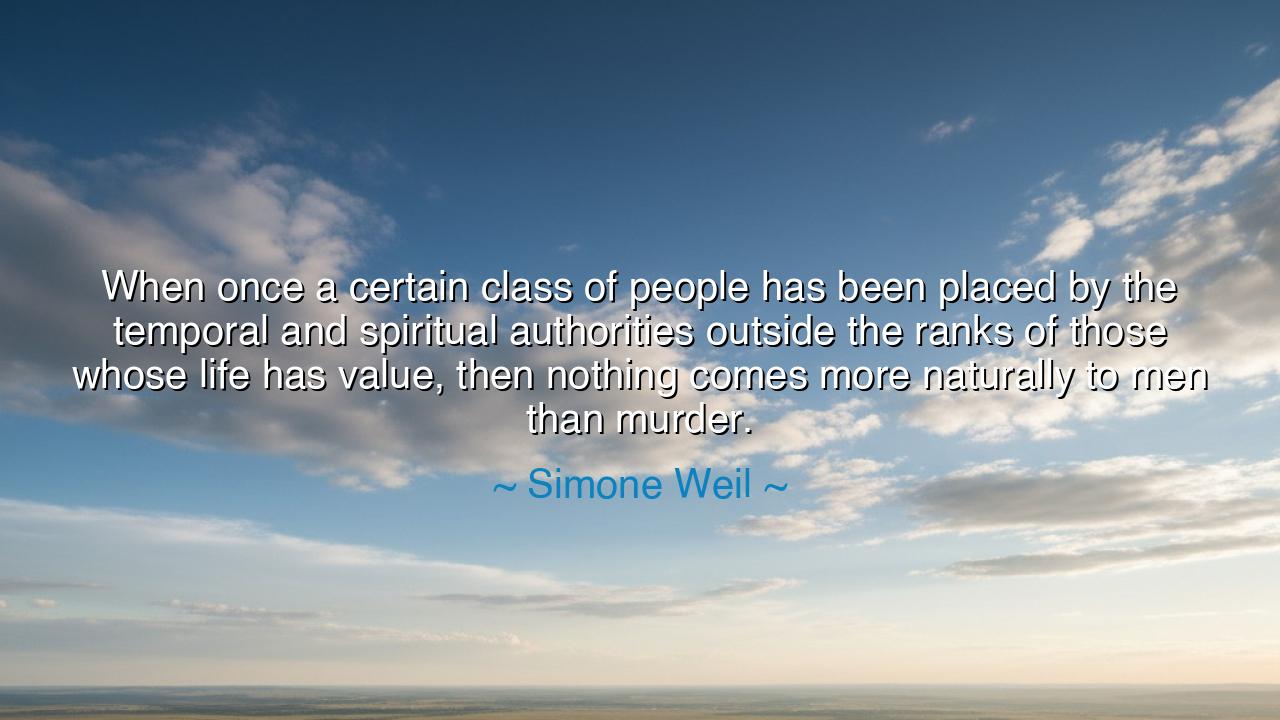
When once a certain class of people has been placed by the
When once a certain class of people has been placed by the temporal and spiritual authorities outside the ranks of those whose life has value, then nothing comes more naturally to men than murder.






"When once a certain class of people has been placed by the temporal and spiritual authorities outside the ranks of those whose life has value, then nothing comes more naturally to men than murder." These profound words by Simone Weil carry with them the weight of moral reckoning. They speak not just of the tragic consequences of dehumanization, but of the perilous path that societies tread when they choose to strip certain individuals or groups of their dignity and worth. To place people outside the circle of humanity is to invite the darkest forces into the soul of a civilization. For once the value of life is denied to any human being, the very foundation of moral restraint begins to crumble, and the natural instinct for violence takes hold.
In the days of the ancient world, there were those who knew well the destructive power of exclusion and oppression. The Greek philosophers taught that to act unjustly, to treat any soul as less than human, was to harm not just the victim, but the entire society. Consider the Athenian democracy, a society that prided itself on being the beacon of freedom, yet simultaneously excluded women, slaves, and foreigners from its political sphere. In their arrogance, they believed they could create a just society while leaving many outside its walls. But the consequences of this exclusion were severe. By denying these individuals their humanity, they not only undermined their own ethical foundations but paved the way for exploitation and cruelty.
Weil’s insight is echoed by the great tragedy of history: when a people or a government chooses to render a certain group invisible, when their lives are considered worthless by the powers that be, violence becomes an acceptable response. The tragic tale of Nazi Germany serves as a powerful illustration of this. In the 1930s and 1940s, the Nazi regime, under the leadership of Adolf Hitler, systematically stripped millions of Jews, Romani people, disabled individuals, and others of their humanity. They were dehumanized through propaganda, reduced to mere numbers, and portrayed as the enemy of the state. Once society accepted that these lives had no value, the horrific actions that followed—the concentration camps, the mass murder of millions—became not just a possibility, but an inevitability.
History has shown us that murder does not happen in a vacuum. It is the natural outcome of a society that has allowed itself to forget the value of human life. When a group of people is othered, when they are treated as though their lives do not matter, it becomes tragically easier for those in power to justify violence against them. The holocaust is a powerful example of this, where the systematic murder of innocent lives became not just a political strategy, but a moral failure of epic proportions. It was a failure rooted in the belief that some lives are less valuable than others, a belief that allowed a nation to justify the most atrocious acts.
But this is not just a lesson for the past; it is one for the present. Every day, we see examples of people who are treated as lesser—whether because of their race, gender, poverty, or immigration status. These individuals are pushed to the margins of society, their voices silenced, their worth denied. Weil’s words remind us that when we allow exclusion to become the norm, we are walking the same dangerous path that leads to violence. It is easy to believe that such things are historical and do not touch our lives today. Yet, the truth is that dehumanization continues in subtle ways, every day, in every corner of the world.
The lesson here is one of profound responsibility—the responsibility to recognize the humanity of every individual, to value life regardless of circumstance. We must never allow society to forget that every life matters, that the value of human beings is not determined by their wealth, their status, their appearance, or any other arbitrary characteristic. To act justly is to protect the dignity of all people, regardless of who they are or where they come from. And if we fail to do so, we risk becoming the very society that Weil warns us against—one where murder, in its many forms, becomes the inevitable consequence of neglect and exclusion.
As we reflect on these teachings, let us take action in our own lives. Stand for those who are marginalized, for those whose lives are deemed lesser. Whether through activism, advocacy, or simply the choice to see people as human, we must ensure that we never fall into the trap of viewing others as outside the ranks of those whose lives matter. Let this wisdom guide our actions and our hearts. For in every act of injustice we allow to stand, we are laying the groundwork for greater atrocities to come. But in every act of compassion, respect, and recognition of humanity, we fortify the walls of justice and ensure that no one is ever left outside the circle of value.






AAdministratorAdministrator
Welcome, honored guests. Please leave a comment, we will respond soon